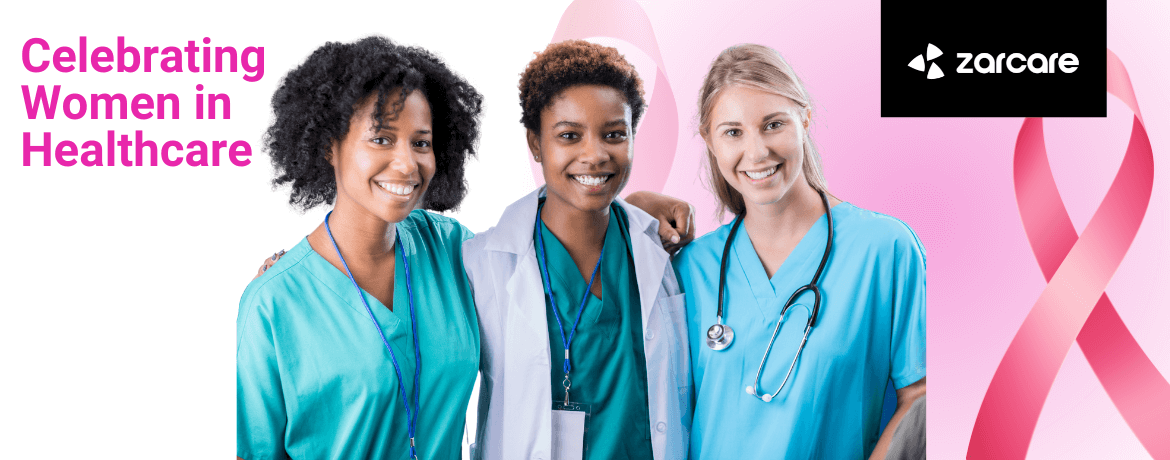Celebrating Women in Healthcare

As Women’s Month comes to an end, it is still a time to dedicate, honour and commemorate the women in the 1956 Women’s March against apartheid laws and serve as a reminder of the ongoing struggle for gender equality. Throughout August, various events, educational campaigns, and community activities were held celebrating women’s resilience, leadership, and impact, to inspire future generations to continue the pursuit of empowerment and equality. At Zarcare, we believe in empowering women, and in our August newsletter, we featured South African women who are making an impact on healthcare. Ananja Van Der Westhuizen, a clinician-researcher doing a Master’s on TB infection in Health Workers at Stellenbosch University’s Faculty of Medicine and Health Sciences. She is passionate about HIV and TB care, has a Diploma in HIV Management, and is a core member of TB PROOF. She believes no one should die from a preventable disease. Nonsi Mathe, a senior research scientist, who is deeply committed to her work in chronic disease epidemiology and public health. Her expertise and dedication are evident in her efforts to address crucial public health issues and promote health equity. Dr Lizanne Langenhoven: Graduating from the University of the Free State in 2005, became a Clinical and Radiation Oncologist at the University of Stellenbosch in 2014. She joined Panorama Mediclinic in 2015 and co-founded the Panorama Centre for Surgical Oncology, focusing on breast, head, neck, and gynaecological cancers. Dr Sahar Abdul-Rasool is a dedicated academic and breast cancer researcher who is focused on empowering women through education and research. As a Senior Lecturer and Head of the Anatomy Cluster at UWC’s Department of Medical Biosciences, she has a significant body of published work that contributes to scientific knowledge and women’s health empowerment. Other SA Women making an impact: Joanne Fedler – born in Johannesburg, South Africa. She studied law at the University of the Witwatersrand and at Yale University before returning to South Africa, where she lectured in law and became legal advisor at People Opposing Women Abuse (POWA), a women’s rights organisation that provides both frontline and advocacy services. Conclusion: https://prezi.com/va2zgtjuxobf/genomic-instability-in-south-african-breast-cancer-patients/ 2. Panorama Centre for Surgical Oncology https://pacso.co.za/dr-langenhoven/ 3. DCF Alumni – Ananja van der Westhuizen https://thecrossleyfoundation.co.za/2024/07/04/dcf-alumni-ananja-van-der-westhuizen/ 4. Nonsikelelo Mathe, PhD: Public Health Epidemiology Researcher https://healthequity.atlanticfellows.org/fellows/nonsikelelo-mathe/ 5. Voices of Empowerment: 24 South African Women
Celebrating women in healthcare involves recognising historical pioneers and those currently making a significant contribution to their field. Here are some notable figures:Historical Pioneers
Impact and Contributions
Celebrating Their Legacy
SA Women of Strength




Qaqamba Gubanca – born in Ngcobo, South Africa. She works as a mentor mother at the Philani Maternal Child Health and Nutrition Trust in Khayelitsha township in Cape Town, South Africa. The Philani Clinic provides holistic health and nutrition support to women and families in townships; its Mentor Mother programme has been extended to South Africa’s Eastern Cape, as well as to Swaziland and Ethiopia. Gubanca is living with HIV.
These women, historical pioneers and current leaders have significantly advanced healthcare, improving patient care, and advancing medical knowledge. Their contributions continue to inspire and pave the way for future generations.
Sources:
1. Genomic Instability in South African Breast Cancer Patients
